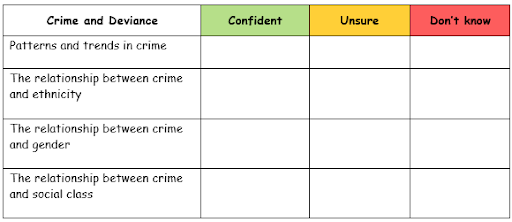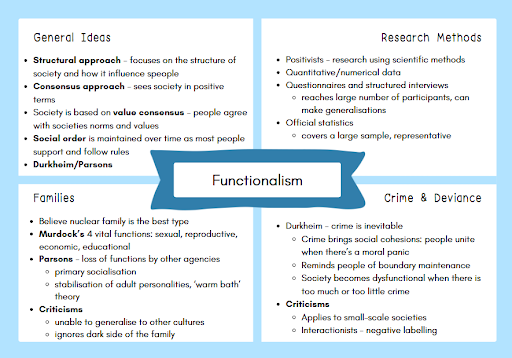Contents
- 1. 1. Know your specification
- 2. 2. Know your key terms and concepts
- 3. 3. Know your studies and sociologists
- 4. 4. Know your sociological perspectives
- 5. 5. Know some contemporary issues
- 6. 6. Know your assessment objectives and command words
- 7. 7. Know your exam papers
- 8. Improve Your Grades with Save My Exams
Feeling swamped by A Level Sociology revision? You’re not the only one. With all the theories, studies, and specialist vocabulary to get your head around, it can be hard to know where to begin. The pressure of memorising so much content can make revision feel more stressful than productive.
But here’s the truth: it doesn’t have to be that way. With the right approach, you can break your revision down into manageable chunks and start to enjoy the process.
As someone who’s been teaching both Sociology and Psychology for over a decade, I’ve seen what works—and what doesn’t. In this guide, I’ll share practical, student-friendly tips to help you feel more in control of your revision and walk into the exam room ready to succeed.
1. Know your specification
Knowing your A Level Sociology specification is super important for revision because it tells you exactly what you need to know for your exams.
Think of it like a checklist — it shows you all the key topics, concepts, theories, and studies that could come up in your exams
The specification helps you understand how different topics are linked and what examiners expect you to know. By using it, you can make sure you’ve covered everything and feel more confident walking into your exams!
Top Tip: Before you start revising, look through the specification and turn each point into a checklist (or ask your teacher for one). Highlight the topics you find tricky and tackle those first. This keeps your study time focused and ensures you cover every required topic. You will also feel more confident and prepared for your exams.

Personal learning checklist for crime and deviance
2. Know your key terms and concepts
Knowing all of the key terms and concepts in A Level Sociology is very important for your revision because they form the foundation of everything you’ll be tested on. Here’s why:
Understanding the basics: Key terms and concepts help you understand the main ideas in sociology. Without them, it’s hard to make sense of the content you will learn
Answering exam questions: Many exam questions will ask you to outline, analyse, or evaluate these terms. If you don’t know them well, it’s difficult to write clear, detailed answers that get top marks
Making connections: Sociology is all about linking ideas together. Knowing key terms helps you connect different topics, theories, and studies, which is great for higher-level answers
Using the right language: Examiners look for specific sociological language in your answers. Using the correct terms shows that you understand the subject and can think like a sociologist
Top Tip: Review your exam specification, as exam boards clearly state the key terms and concepts you may need to define. Use our sociology glossary (or the back of your textbook) to help you understand and define key terms accurately.
Find a strategy that helps you learn these key terms; some examples are below:
Glossary Notebook: Keep a log of important key terms and definitions. Update it regularly
DIY Quizzes: Create multiple-choice quizzes, fill-in-the-blank, or matching exercises to test yourself
Flashcards: Write the term on one side and the definition on the other. Over time, add extra details like examples, links to other topics and related studies
Mind maps: For bigger concepts (e.g., gender differences in education), create a visual map that includes
A sociologist and/or perspective
Details about what the concept entails
Any strengths or disadvantages
Links to the key topics in sociology
3. Know your studies and sociologists
When revising for A Level Sociology, knowing all the key studies and thinkers is essential for success. Here’s why:
Referencing sociologists like Durkheim on social solidarity or Parsons on the family shows you understand where the ideas come from
Citing studies gives you hard evidence, not just opinions. It backs up your points and makes your arguments stronger
Including studies boosts your analysis. This is because you can say who said what, how they found it out, and why it matters
Although the AQA specification (opens in a new tab) doesn’t name any individual sociologists or studies, don’t be lulled into thinking they don’t matter! Your course textbook and your teacher’s lesson materials will be packed with key thinkers whose work is important to know.
Top Tip: I recommend that students create a summary of all key studies/thinkers covered in the course. By exam season, you’ll have a “cheat sheet” of exactly the evidence your teacher expects you to use. Spend five minutes each week updating it, and you’ll thank yourself in the final revision push!
Sociologist / Study | Topic & Perspective | Method | Key Findings | Strengths & Limitations |
4. Know your sociological perspectives
Understanding key sociological perspectives like functionalism, Marxism, feminism, and views such as Postmodernism and the New Right is essential for A Level Sociology revision. Here’s why:
In extended writing questions, comparing perspectives shows that you can look at an issue from more than one angle. Knowing each perspective’s strengths and weaknesses lets you weigh up ideas—exactly what the examiner wants for top marks
Knowing the different perspectives and how they link across topics like education and crime, and deviance helps you make connections and see the bigger picture
Top Tip: Make a mind map or revision grid for each perspective. This will help you connect ideas from across the course, making it easier to see how different concepts link together. It’s also an excellent way to prepare for the extended writing questions, as it allows you to organise your knowledge clearly.

Revision grid summarising the functionalist perspective
5. Know some contemporary issues
A Level Sociology is all about connecting ideas to the real world—your world. When you bring in local case studies, news stories, or things you’ve seen in everyday life, you:
Grab the examiner’s attention. Real examples show you can apply theory, not just memorise it
Build stronger arguments. Facts and case studies act as proof, which is vital for the longer essay questions
Remember ideas more easily. Linking a theory to a headline or personal experience fixes it in your mind
Top Tip: I encourage students to have at least one reliable news app on their phones to stay up-to-date with current events that connect to their sociology studies. When a story pops up, e.g., the cost-of-living crisis or the Israel-Gaza war, ask yourself, Which part of the course does this fit? Jot down the event, the sociological concept it illustrates, and one key fact or figure.
6. Know your assessment objectives and command words
Understanding the assessment objectives (AOs) and command words is key to exam success in A Level Sociology. Here’s why:
AOs guide you on the skills the examiner is checking. This includes showing what you know, applying ideas to examples, or evaluating ideas
Command words are verbs that tell you how to use those skills, e.g., “outline”, “analyse”, or “evaluate”
Spotting these words first lets you plan the right kind of answer and stops you from wasting time on things the question isn’t asking.
Top Tip: Ensure that you are familiar with the AOs and command words. This reduces exam stress and improves time management, as you’ll know how much detail is needed for each question. Make it part of your revision to review these regularly to boost your confidence and performance in the exam.
7. Know your exam papers
Practising past papers is one of the most effective ways to prepare for your A Level Sociology exam. Here’s why:
Know the layout. You’ll see exactly how many questions, how many marks, and how the sections are organised, so there are no surprises on exam day
Sharpen your technique. Regular practice trains you to drop key terms and concepts into answers effectively
Spot the gaps. When you mark your work, gaps in your knowledge jump out, telling you where to focus next
Learn the mark scheme. Comparing your answers with the official scheme shows you what examiners credit and how to meet the assessment objectives
Top Tip: Set a timer every time you do a past paper. Working to the clock builds time-management skills, so you finish every question comfortably on exam day.
Improve Your Grades with Save My Exams
Here at Save My Exams, we develop high-quality, affordable revision resources that will help you study effectively and get the most out of your revision. Our revision resources are written by teachers and examiners. That means notes, questions by topic and worked solutions that show exactly what the examiners for each specific exam are looking for.
Explore Our A Level Sociology Revision Resources
References
AQA (opens in a new tab) (2021) (opens in a new tab)AS and A Level Sociology Specification (7191; 7192), Version 1.2 (opens in a new tab): Accessed 27 June 2025
OCR (opens in a new tab)(2024) (opens in a new tab)A Level Specification Sociology (H580), Version 1.3 (opens in a new tab): Accessed 27 June 2025
WJEC (2020) GCE AS/A LEVEL in Sociology, Version 3 (opens in a new tab): Accessed 27 June 2025
Sign up for articles sent directly to your inbox
Receive news, articles and guides directly from our team of experts.

Share this article
 written revision resources that improve your
written revision resources that improve your